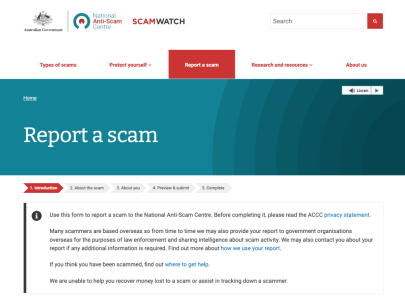Shield yourself! Discover the top tips from experts on how to avoid being scammed
By
VanessaC
- Replies 5
Nobody enjoys being a victim of someone else's dishonesty, especially when it costs you your hard-earned cash.
And with the rise of online scams, everyone must be extra vigilant and prepared so they don't become targets.
Although technology has revolutionised our lives, it has also been used to scam unsuspecting people.
These days, many advertisements with unbelievable deals and discounts have spread online, and Australian Competition and Consumer Commission (ACCC) Deputy Chair Catriona Lowe says you’re probably right to think they’re too good to be true, as they could very well be scams.
It’s high time we share some knowledge from experts from banks, police, and other fraud agencies to help you avoid these scams.
So here are some tips to shield yourself from scammers and their cunning traps:
Tip 1: Just Stop
According to Detective Sergeant John Cheyne of Victoria Police's Cybercrime Squad is to just 'take a step back'.
Scammers create a sense of urgency by trying to rush you into a decision or a response immediately after they’ve contacted you. This can then put a victim under stress and cloud their judgment.
However, experts emphasised that you are not required to immediately respond to a text, email, or phone call asking to share your personal details, most especially your bank account details.
'Stop, talk to somebody and really think about what you're doing,' Detective Cheyne advised.
Tip 2: Never Move Your Money
Be especially cautious when it comes to money. If the person who contacted you is claiming to be from a bank or financial institution, don’t buy into the con and instead call the bank's main phone number to confirm if the text, email, or call you received is authentic.
According to Shaq Johnson, Head of Consumer Protection of Australia and New Zealand Banking Group (ANZ), it's important to remember: 'The bank will never ask you to move your money.'
If you need to give your bank details to get paid for a job, such as a work-from-home advertisement, the ACCC’s Catriona Lowe said it’s still worth being mindful of.
'Be extra suspicious if they [then] ask you to make a payment, particularly in cryptocurrency.'
Tip 3: Check the Source
It’s always vital to make sure you are dealing with a legitimate and trusted source.
Experts recommended contacting the actual company or organisation and not relying on the phone number or email address given to you in a message or an email you received.
'Contact your bank immediately on a number that is listed on their website,' ANZ’s Shaq Johnson says.
You can also search for their details online from their official website, so you know you’re dealing with the real deal.
Tip 4: Don't Click Links
The notorious blue link may be tempting to click. However, clicking these links may come with consequences.
Catriona Lowe from the ACCC warned: 'Scammers have got access to sophisticated spoofing technology that can make something appear like it's from a legitimate company.'
Experts reminded everyone to be careful of links in emails and messages claiming to be from delivery and toll companies, the ATO, Centrelink, and MyGov.
Moreover, for any payments, always go to your bank’s official website.
Tip 5: If You See Red Flags, Flag and Report Them
This step is particularly useful if you’ve caught on to the warning signs that the offer you were given was, in fact, a scam.
If you realise that you are about to be manipulated, quickly stop the con artist in their tracks and report to authorities as soon as possible. That way, telecommunication companies can have their people work on blocking the number to stop the scam.
Reporting these scams to proper authorities is vital as it can help somebody else avoid them in the future.
You can report scams through this link.
Bonus Tip: Stay Updated
A lot of scams are more sophisticated than we think and realise, so as Telstra’s Chief Information and Security Officer Narelle Devine said: 'We need everybody to play their part.'
'It is really important we keep talking about it, and we keep educating people on what the scams look like today.'
You can do this by regularly checking our very own Scam Watch forum for the latest stories and news about circulating scams.
You can also stay updated with the latest news from the National Anti-Scam Centre here.
 Members, do you have other tips on how to avoid being scammed? Share them with us in the comments below!
Members, do you have other tips on how to avoid being scammed? Share them with us in the comments below!
And with the rise of online scams, everyone must be extra vigilant and prepared so they don't become targets.
Although technology has revolutionised our lives, it has also been used to scam unsuspecting people.
These days, many advertisements with unbelievable deals and discounts have spread online, and Australian Competition and Consumer Commission (ACCC) Deputy Chair Catriona Lowe says you’re probably right to think they’re too good to be true, as they could very well be scams.
It’s high time we share some knowledge from experts from banks, police, and other fraud agencies to help you avoid these scams.
So here are some tips to shield yourself from scammers and their cunning traps:
According to Detective Sergeant John Cheyne of Victoria Police's Cybercrime Squad is to just 'take a step back'.
Scammers create a sense of urgency by trying to rush you into a decision or a response immediately after they’ve contacted you. This can then put a victim under stress and cloud their judgment.
However, experts emphasised that you are not required to immediately respond to a text, email, or phone call asking to share your personal details, most especially your bank account details.
'Stop, talk to somebody and really think about what you're doing,' Detective Cheyne advised.
Tip 2: Never Move Your Money
Be especially cautious when it comes to money. If the person who contacted you is claiming to be from a bank or financial institution, don’t buy into the con and instead call the bank's main phone number to confirm if the text, email, or call you received is authentic.
According to Shaq Johnson, Head of Consumer Protection of Australia and New Zealand Banking Group (ANZ), it's important to remember: 'The bank will never ask you to move your money.'
If you need to give your bank details to get paid for a job, such as a work-from-home advertisement, the ACCC’s Catriona Lowe said it’s still worth being mindful of.
'Be extra suspicious if they [then] ask you to make a payment, particularly in cryptocurrency.'
Tip 3: Check the Source
It’s always vital to make sure you are dealing with a legitimate and trusted source.
Experts recommended contacting the actual company or organisation and not relying on the phone number or email address given to you in a message or an email you received.
'Contact your bank immediately on a number that is listed on their website,' ANZ’s Shaq Johnson says.
You can also search for their details online from their official website, so you know you’re dealing with the real deal.
Tip 4: Don't Click Links
The notorious blue link may be tempting to click. However, clicking these links may come with consequences.
Catriona Lowe from the ACCC warned: 'Scammers have got access to sophisticated spoofing technology that can make something appear like it's from a legitimate company.'
Experts reminded everyone to be careful of links in emails and messages claiming to be from delivery and toll companies, the ATO, Centrelink, and MyGov.
Moreover, for any payments, always go to your bank’s official website.
Tip 5: If You See Red Flags, Flag and Report Them
This step is particularly useful if you’ve caught on to the warning signs that the offer you were given was, in fact, a scam.
If you realise that you are about to be manipulated, quickly stop the con artist in their tracks and report to authorities as soon as possible. That way, telecommunication companies can have their people work on blocking the number to stop the scam.
Reporting these scams to proper authorities is vital as it can help somebody else avoid them in the future.
You can report scams through this link.
Bonus Tip: Stay Updated
A lot of scams are more sophisticated than we think and realise, so as Telstra’s Chief Information and Security Officer Narelle Devine said: 'We need everybody to play their part.'
'It is really important we keep talking about it, and we keep educating people on what the scams look like today.'
You can do this by regularly checking our very own Scam Watch forum for the latest stories and news about circulating scams.
You can also stay updated with the latest news from the National Anti-Scam Centre here.
Key Takeaways
- The Australian Competition and Consumer Commission (ACCC) Deputy Chair Catriona Lowe warned consumers that online deals that are too good to be true could potentially be scams.
- Experts from banks, police, telcos and fraud agencies shared five tips to avoid getting scammed: stop and think, never move money based on someone else's request, check if the source is trusted, avoid clicking on suspicious links, and report suspected scams.
- Telstra’s Chief Information and Security Officer Narelle Devine warns that scams are evolving and advises consumers to continuously educate themselves on what modern scams look like.









